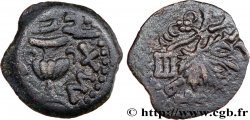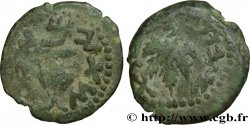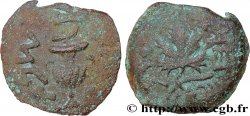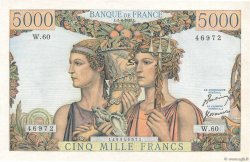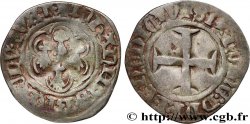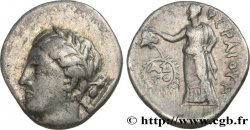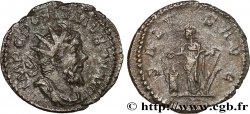v11_0178 - JUDAEA - FIRST REVOLT Prutah, ou unité de bronze Æ 18
MONNAIES 11 (2002)
Starting price : 99.09 €
Estimate : 144.83 €
Realised price : 99.09 €
Number of bids : 1
Maximum bid : 176.08 €
Starting price : 99.09 €
Estimate : 144.83 €
Realised price : 99.09 €
Number of bids : 1
Maximum bid : 176.08 €
Type : Prutah, ou unité de bronze Æ 18
Date: 67
Mint name / Town : Judée, Jérusalem
Metal : copper
Diameter : 18 mm
Orientation dies : 5 h.
Weight : 2,93 g.
Rarity : R1
Coments on the condition:
Flan irrégulier et légèrement échancré. Usure importante, mais totalement identifiable
Catalogue references :
Predigree :
Feuille et branche de vigne, rappel de la fertilité de la Judée (symbole souvent représenté, en dehors même des monnaies, depuis les temps les plus reculés de la Bible).Flan régulier, patine marron. Bel exemplaire (nota : de bien meilleure qualité que le n° 178 de Monnaies XI). SNG ANS 427 sq - Reif. 147 R. Très BeauAprès la mort d'Hérode le Grand (37 - 4 av. J.-C.), une lutte sourde est engagée par les Juifs contre l'introduction des cultes étrangers et contre ceux qui collaborent avec l'occupant romain. En 67, la révolte armée éclate et surprend les troupes romaines qui essuient des revers jusqu'à l'arrivée de Vespasien, nommé par Néron légat impérial chargé de la répression à la tête de trois légions. Un certain Joseph, commandant l'une des armées juives résiste dans la citadelle de Jotapata. Réfugié dans une grotte avec une quarantaine de notables, il échappe à leur suicide collectif, se rend et prédit l'empire à Vespasien. La prédiction se réalise deux ans plus tard, en 69. Le prisonnier est alors affranchi et selon la coutume romaine prend le nom gentilice de son protecteur (Flavius) : il est désormais Flavius-Joseph, précieux historien de la guerre dont il est acteur (ambigu) et témoin (peu objectif). Vespasien confie le commandement à son fils aîné et fidèle lieutenant Titus, qui - en 70 - incendie Jérusalem, pille et détruit le Temple (dont il ne subsiste que le Mur occidental, dit " mur des lamentations "). C'est la fin de la guerre des Juifs, même si la forteresse de Massada résiste jusqu'en 74. Vespasien et Titus célèbrent leur victoire par un triomphe commun, en juin 71.
Obverse
Obverse legend : INSCRIPTION HÉBRAÏQUE, SHENAT SHAT'IM'.
Obverse description : Vase ou aiguière (objet du culte).
Obverse translation : ( an 2 - c'est à dire 67/68 ap. J.-C.).
Reverse
Reverse legend : INSCRIPTION HÉBRAÏQUE, HERTU Z'ION .
Reverse description : Feuille de vigne.
Reverse translation : (délivrance de Sion - c'est à dire Judée délivrée des Romains).
Commentary
Traces de surfrappe sur un bronze d’Agrippa ou d’un procurateur romain.








 Report a mistake
Report a mistake Print the page
Print the page Share my selection
Share my selection Ask a question
Ask a question Consign / sell
Consign / sell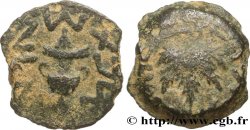
 Full data
Full data